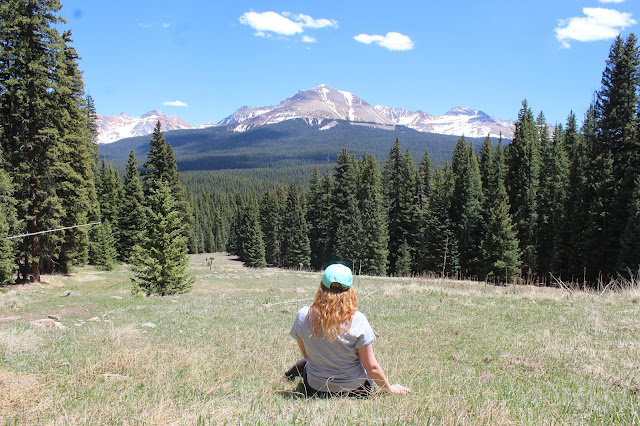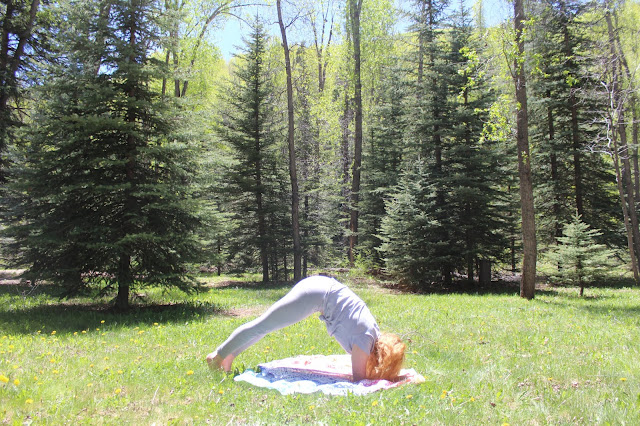 |
| Lizard Head Peak |
Thursday, May 17, 2018
There's nothing better than having warm, apple pie in the summer with some refreshing ice cream! I found a great recipe from pinterest, which I'll post below. I highly recommend this recipe - I followed it exactly, and everyone in my family devoured it in seconds (I'm NOT exaggerating here but then again my family LOVES food).
Recipe adapted from: http://allrecipes.com/Recipe/Apple-Pie-by-Grandma-Ople/
Ingredients:
- 2 batches of pie crust (you can either make this yourself or get store bought, I got store bought)
- 7-8 small granny smith apples, peeled, sliced, and cored
- 1 stick butter
- 3 tbsp all-purpose flour
- 1/4 cup water
- 1/2 cup white sugar
- 1/2 cup brown sugar
- 1 heaping tsp cinnamon
- 1/4 tsp nutmeg
- 1 tsp vanilla
Book review: Susan Cain's book Quiet: The Power of Introverts in a World That Can't Stop Talking
With me having recently graduated with a Bachelor's of Arts in English, I have gone out of town to escape reality for a while. It's amazing how stepping away from the constant stress of life and rooting yourself back to what truly matters can do for your mentality. All the anxiety I was feeling a couple weeks ago is -BOOM. Gone.
And it feels amazing.
With this newfound time, I have spent time hiking, doing photography, eating healthy, writing, and reading. I have just finished reading Susan Cain's book Quiet: The Power of Introverts in a World That Can't Stop Talking. My professor had actually recommended this to me, knowing that I considered myself an introvert. And let me tell you, this book changed my life.
When I was growing up, my parents used to get concerned about me because I was super quiet and often times spent more time alone than with other kids. Thus, it often took me some time to make friends. They used to say I was "shy" or "had trouble making friends" when in reality, I just genuinely enjoyed spending time with myself. In fact, my parents often spoke to my teachers, to which my teachers would reassure my parents that in a few years, their daughter would break out of their shell.
I didn't.
In fact, my first year of college, one of my good friends from high school was concerned about me making friends. It was my 1st official time out of my parent's home, and she was making friends like crazy! However, she was an extrovert, whereas I was an introvert. I remember she used to make remarks all the time and basically made me feel weird or abnormal for not wanting to go to college parties to meet people. Despite me telling her that parties like that simply weren't my kind of atmosphere, she thought I was weird. One time she actually told me that, and, a bit irritated, I responded that yes, I took a while making friends, but I was about quality over quantity. I'd rather have a few amazing friends than 50 lousy ones.
Needless to say, she stopped bugging me about that since that conversation.
Sure enough, I was right. By my 3rd year in college, I had amazing friends (and still do) that I know for a fact will do anything for me. This is one example of how my personality of being an introvert affected the way people treated me, or how I thought people saw me. Cain's book is all about this misconception towards introvert individuals and how in our current society, we often coin them as weird, abnormal, slow - basically we label introversion as being an impairment and that we need to shed those aspects in order to be successful in our society.
This, Cain argues, is wrong.
This book seeks to empower individuals who can relate to issues introverts deal with daily. But Cain doesn't just focus on how the masses treat introversion. Rather, she empowers you - the reader, and refutes that your introversion is in fact not a disability but an asset. Ultimately, she contends that everyone is different; thus, everyone needs their own "settings" in order to thrive. If you're a scientist, for example, who prefers working alone in a lab, do it. On the other hand, if you're an energetic salesman who thrives with human communication, do it. But it is crucial for all of us to discover who we are and what environment encourages us to thrive and live a genuine life rather than merely conforming to what society deems as appropriate.
Some individuals Cain includes for example are Rosa Parks and Albert Einstein, who were both known as introverts. All in all, this book empowered me not to feel ashamed for my introvert tendencies but to use them for my own success and happiness in life.
Tuesday, May 15, 2018
Benefits of the Downward Facing Dog Pose: Yoga
Benefits of the Downward Facing Dog:
- Calms the brain and helps relieve stress and mild depression
- Energizes the body
- Stretches the shoulders, hamstrings, calves, arches, and hands
- Strengthens the arms and legs
- Helps relieve the symptoms of menopause
- Relieves menstrual discomfort when done with head supported
- Helps prevent osteoporosis
- Improves digestion
- Relieves headache, insomnia, back pain, and fatigue
- Therapeutic for high blood pressure, asthma, flat feet, sciatica, sinusitis
Source: https://www.yogajournal.com/poses/downward-facing-dog
Benefits of the Camel Pose: Yoga
Benefits of Camel Pose:
- Reduces fat on thighs
- Opens up the hips, stretching deep hip flexors
- Stretches and strengthens the shoulders and back
- Expands the abdominal region, improving digestion and elimination
- Improves posture
- Opens the chest, improving respiration
- Loosens up the vertebrae
- Relieves lower back pain
- Helps to heal and balance the chakras
- Strengthens thighs and arms
- Improves flexibility, especially in the spine
- Stimulates endocrine glands
- Releases tension in the ovaries
- Stretches the ankles, thighs, groin, abdomen, chest, and throat
- Cures constipation
- Tones organs of the abdomen, pelvis, and neck
- Complements overall health and well-being
Source: http://www.cnyhealingarts.com/2011/01/11/the-health-benefits-of-ustrasana-camel-pose/
Subscribe to:
Comments (Atom)












